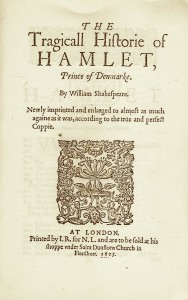 When I studied textual criticism and palaeography at University under the legendary Peter Davison (editor of Orwell’s letters) I recall being impressed by the exceeding rarity of the original quarto editions of Shakespeare’s plays. Rarer than hen’s teeth was, I believe, the phrase used. This was because the actors who used them to learn their lines in Shakespeare’s time had no reason to keep them after their acting careers had ended. Shakespeare was just another playwright, and it was only with the posthumous publication of the First Folio in 1623, when all the plays were collected together, that his true greatness began to be recognised.
When I studied textual criticism and palaeography at University under the legendary Peter Davison (editor of Orwell’s letters) I recall being impressed by the exceeding rarity of the original quarto editions of Shakespeare’s plays. Rarer than hen’s teeth was, I believe, the phrase used. This was because the actors who used them to learn their lines in Shakespeare’s time had no reason to keep them after their acting careers had ended. Shakespeare was just another playwright, and it was only with the posthumous publication of the First Folio in 1623, when all the plays were collected together, that his true greatness began to be recognised.
These pamphlet-like quartos—often badly printed and containing countless errors—were published in small numbers and were not surprisingly badly treated by the jobbing actors who used them every day. Very few survived, hence their great rarity. Despite this, it wasn’t until the early twentieth century, when American multi-millionaires came into the market, that the first quartos began to fetch startling prices—startling, that is, for the time. Today, such treasures might bring in six figure sums. Continue reading

